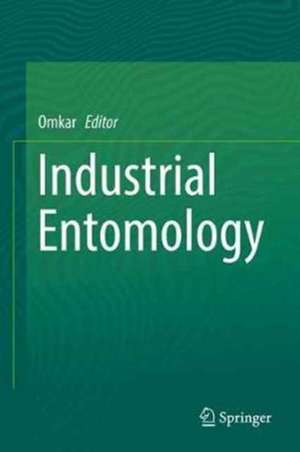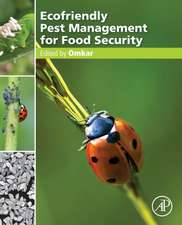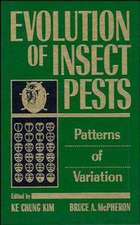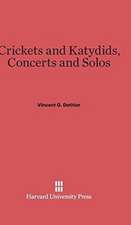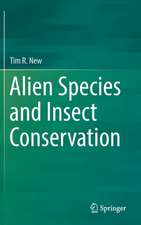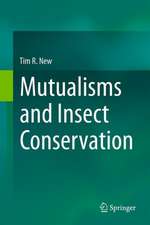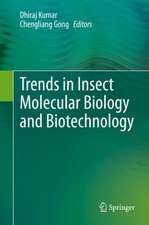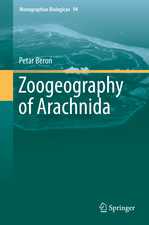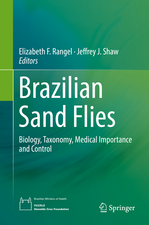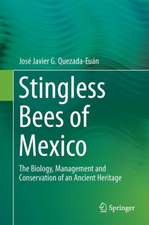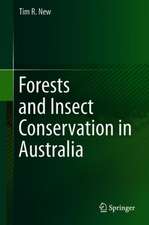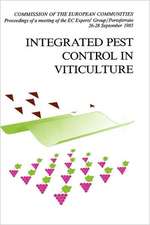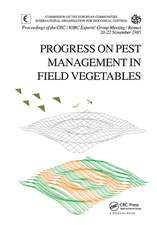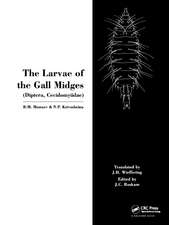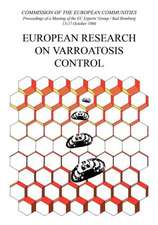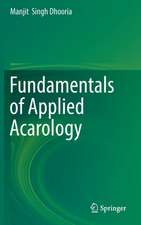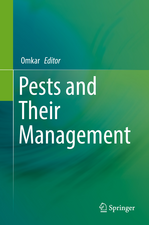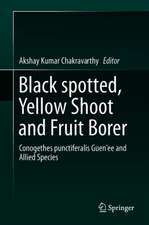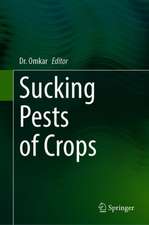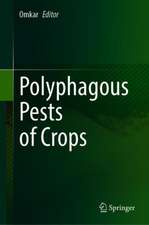Industrial Entomology
Editat de Omkaren Limba Engleză Hardback – 20 feb 2017
The book highlights the all pervasive role of insects in improving human lives at multiple levels. Accordingly, while most books on insects concentrate on how to limit growth in their population, it instead focuses on how to propagate them. In each chapter, the book brings to the fore how insects are far more beneficial to us than their well publicised harmful roles.
This book approaches both unconventional and conventional insect products, such as honey, silk and lac in much more depth than theavailable literature. It investigates different aspects of the production of these insects, such as the related processes, problems and utilities, in dedicated chapters.
Because this book deals with the production of insects or their produce, it has been named Industrial Entomology, perhaps the only book that truly reveals the tremendous potential of insects to help humans live better lives. Based on the research and working experience of the contributors, who are global experts in their respective fields, it provides authentic, authoritative and updated information on these topics.
The book offers a unique guide for students, teachers, policy planners, small scale industrialists, and government ministries of agriculture and industry across the globe. It will provide a much required stimulus to insect appreciation and generate enthusiasm for research and the broader acceptance for insect produce. Hopefully, it will also present the Indian perspective on these topics to aglobal readership.
| Toate formatele și edițiile | Preț | Express |
|---|---|---|
| Paperback (1) | 1387.73 lei 3-5 săpt. | |
| Springer Nature Singapore – 5 sep 2018 | 1387.73 lei 3-5 săpt. | |
| Hardback (1) | 1400.67 lei 3-5 săpt. | |
| Springer Nature Singapore – 20 feb 2017 | 1400.67 lei 3-5 săpt. |
Preț: 1400.67 lei
Preț vechi: 1708.13 lei
-18% Nou
Puncte Express: 2101
Preț estimativ în valută:
268.05€ • 278.82$ • 221.29£
268.05€ • 278.82$ • 221.29£
Carte disponibilă
Livrare economică 24 martie-07 aprilie
Preluare comenzi: 021 569.72.76
Specificații
ISBN-13: 9789811033032
ISBN-10: 981103303X
Pagini: 465
Ilustrații: XI, 465 p. 173 illus., 103 illus. in color.
Dimensiuni: 155 x 235 x 33 mm
Greutate: 1.01 kg
Ediția:1st ed. 2017
Editura: Springer Nature Singapore
Colecția Springer
Locul publicării:Singapore, Singapore
ISBN-10: 981103303X
Pagini: 465
Ilustrații: XI, 465 p. 173 illus., 103 illus. in color.
Dimensiuni: 155 x 235 x 33 mm
Greutate: 1.01 kg
Ediția:1st ed. 2017
Editura: Springer Nature Singapore
Colecția Springer
Locul publicării:Singapore, Singapore
Cuprins
Chapter 1. An Introduction to Industrial Entomology,- Chapter 2. Honey Bee: Diversity, Castes and Life Cycle.- Chapter 3. Beekeeping in India.- Chapter 4. Diseases and Enemies of Honeybees.- Chapter 5. Lac Culture.- Chapter 6. Lac Insects and Host Plants.- Chapter 7. Lac Crop Harvesting and Processing.- Chapter 8. Mulberry Sericulture.- Chapter 9. Silkworm Diseases and Pests.- Chapter 10. Tropical Tasar Culture.- Chapter 11. Temperate Tasar Culture.- Chapter 12. Ericulture: an Ideal Avenue for Sustainable Livelihood.- Chapter 13. Muga Sericulture.- Chapter 14. Insect Crop Pollinators.- Chapter 15. Insects as Food.- Chapter 16. Entomoceuticals.- Chapter 17. Mass Production of Biocontrol Agents of Insect Pests.
Notă biografică
Prof. Omkar has been actively engaged in teaching for over three decades and in research for nearly four decades. He is currently working as Professor and Head of the Department of Zoology, University of Lucknow, India. He is a Fellow of the National Academy of Sciences, India and seven more professional bodies. His contributions have gained him several distinctions: the Young Indian Zoologist of 20th Century Gold Medal from the Zoological Society of India (2000), the Prof. T N Ananthakrishnan Foundation Award from the Prof. T. N. Ananthakrishnan Foundation, Chennai (2012), the Rescholar Award of Excellence in Agricultural Entomology from the Association of Entomologists, Patiala (2014) and the Prof. G. S. Shukla Gold Medal from the Academy of Environmental Biology, India (2014). He has authored the books Concepts of Toxicology, Experimental Animal Physiology & Biochemistry, Kin recognition and Oviposition Strategies in aphidophagous ladybirds, andMonitoring and Management of Mango fruit fly, Predaceous Ladybirds of Uttar Pradesh; and edited the books Pesticides, Man & Biosphere, Prof. S. B. Singh Commemoration Volume, Modern Approaches to Insect Pest Management, and Ecofriendly Pest Management for Food Security (Academic Press/Elsevier Inc.).
Prof. Omkar has published more than 150 research papers in international journals and 62 in Indian journals, 21 book chapters and 14 popular science articles. His research primarily concerns identifying and harnessing the potential of beneficial insects, in particular ladybird beetles, for which he is globally recognized. He has supervised 20 Ph.D. theses and completed ten research projects funded by state and central govt. agencies. He is a member of the editorial board for the Journal of Tropical Insect Science, Cambridge University Press and chief editor of the Journal of Applied Bioscience besides being President of the International Society of Applied Biology. He works as a referee for nearly 40 international and 20 prominent Indian journals, in addition to serving as a subject expert on grant applications for the Swiss National Science Foundation and other central and state govt. funding agencies. He has received prestigious travel awards from the Indian National Science Academy, New Delhi, which have allowed him to travel and collaborate with global experts on ladybird biology at the University of East Anglia, UK and the University of South Bohemia and Czech Academy of Sciences, Czech Republic
Prof. Omkar has published more than 150 research papers in international journals and 62 in Indian journals, 21 book chapters and 14 popular science articles. His research primarily concerns identifying and harnessing the potential of beneficial insects, in particular ladybird beetles, for which he is globally recognized. He has supervised 20 Ph.D. theses and completed ten research projects funded by state and central govt. agencies. He is a member of the editorial board for the Journal of Tropical Insect Science, Cambridge University Press and chief editor of the Journal of Applied Bioscience besides being President of the International Society of Applied Biology. He works as a referee for nearly 40 international and 20 prominent Indian journals, in addition to serving as a subject expert on grant applications for the Swiss National Science Foundation and other central and state govt. funding agencies. He has received prestigious travel awards from the Indian National Science Academy, New Delhi, which have allowed him to travel and collaborate with global experts on ladybird biology at the University of East Anglia, UK and the University of South Bohemia and Czech Academy of Sciences, Czech Republic
Textul de pe ultima copertă
This book is a compilation of writings focused on conventional and unconventional insect products. Some of these products are commercials successes, while others are waiting to be launched and are the potential produce of the future. In addition to the well known products honey, mulberry silk, and lac, the book primarily concentrates on silk producing insects other than the mulberry silkworm, insects as food, as sources of medicines, pest and weed managers, and as pollinators.
The book highlights the all pervasive role of insects in improving human lives at multiple levels. Accordingly, while most books on insects concentrate on how to limit growth in their population, it instead focuses on how to propagate them. In each chapter, the book brings to the fore how insects are far more beneficial to us than their well publicised harmful roles.
This book approaches both unconventional and conventional insect products, such as honey, silk and lac in much more depth thanthe available literature. It investigates different aspects of the production of these insects, such as the related processes, problems and utilities, in dedicated chapters.
Because this book deals with the production of insects or their produce, it has been named Industrial Entomology, perhaps the only book that truly reveals the tremendous potential of insects to help humans live better lives. Based on the research and working experience of the contributors, who are global experts in their respective fields, it provides authentic, authoritative and updated information on these topics.
The book offers a unique guide for students, teachers, policy planners, small scale industrialists, and government ministries of agriculture and industry across the globe. It will provide a much required stimulus to insect appreciation and generate enthusiasm for research and the broader acceptance for insect produce. Hopefully, it will also present the Indian perspective on these topics to a global readership.
The book highlights the all pervasive role of insects in improving human lives at multiple levels. Accordingly, while most books on insects concentrate on how to limit growth in their population, it instead focuses on how to propagate them. In each chapter, the book brings to the fore how insects are far more beneficial to us than their well publicised harmful roles.
This book approaches both unconventional and conventional insect products, such as honey, silk and lac in much more depth thanthe available literature. It investigates different aspects of the production of these insects, such as the related processes, problems and utilities, in dedicated chapters.
Because this book deals with the production of insects or their produce, it has been named Industrial Entomology, perhaps the only book that truly reveals the tremendous potential of insects to help humans live better lives. Based on the research and working experience of the contributors, who are global experts in their respective fields, it provides authentic, authoritative and updated information on these topics.
The book offers a unique guide for students, teachers, policy planners, small scale industrialists, and government ministries of agriculture and industry across the globe. It will provide a much required stimulus to insect appreciation and generate enthusiasm for research and the broader acceptance for insect produce. Hopefully, it will also present the Indian perspective on these topics to a global readership.
Caracteristici
Presents comprehensive information collated by senior specialists Covers wide aspects of industrial and agricultural entomology Contains authentic, authoritative and updated information on the topics Includes supplementary material: sn.pub/extras
